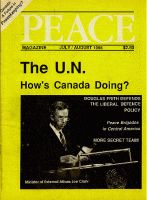
Peace Magazine Aug-Sep 1988, page 14. Some rights reserved.
Search for other articles by John Bacher here
LEAVING A TRAIL OF BLOOD IN CUBA, LAOS, AND Vietnam, Theodore Shackley and Thomas Clines were given a new assignment: the overthrow of the elected government of Salvador Allende in Chile (See Heinrich Kruger, The Great Heroin Coup). Although their mission was to prove more successful than their previous assignment, the consequences would be equally tragic.
In 1972, Theodore Shackley and Tom Clines were elevated to CIA's Western Hemisphere operations. Shackley became Chief and Clines his Deputy.
Some of the "dirty tricks" used by the CIA against Chilean democracy are well known. Others involved overt pressure, such as the cutting off of all U.S. and Inter-American Development bank loans, the end of all assistance from the World Bank, and the refusal of American suppliers to sell needed parts for dependent Chilean copper, steel, electricity, and petroleum industries. CIA disinformation tried to make military officers believe Allende was going to allow the USSR and North Korea to establish submarine and training bases.
Besides scheming to destabilize democracy by fomenting economic crises, the CIA under Shackley and Clines aided Chile's fascist organization, Patria y Libertad, and trained its members as guerrillas in Bolivia and Los Fresnos, Texas. They marched into political rallies wearing riot gear, engaged in violence, and in its publications openly urged a military coup.
Foes of the Pinochet dictatorship realize that it came to power by the massacre of 30,000 civilians. What they may not realize is that Patria y Libertad was aided as part of a general imposition of fascist dictatorships in Latin America, supported by terrorist organizations funded by the drug trade. Even Mexico, one Latin America's most stable, if not most perfect democracies was threatened by one Secret Team extremist.
WHILE PREPARING FOR THE CHILEAN COUP, Shackley had all telephone conversations to and from Latin America tapped, under pretext of narcotics control operations. One of Shackley's colleagues was an old contact, Alberto Sicilia-Falcon, a Cuban exile trained by the CIA as part of the Bay of Pigs invasion. While Shackley destabilized Chile, he established a gigantic heroin and marijuana ring in Mexico, which involved 1,000 persons, including film stars and international businessmen. After the overthrow of Allende, Sicila-Falcon sold guns and narcotics to spread violence in Mexico. In 1975 Sicila-Falcon was arrested and confessed to being a CIA agent, engaged in business to provide profits with which to buy ammunition for the destabilization of "undesirable" governments. FBI documents later released under the Freedom of Information Act revealed that the U.S. Embassy and U.S. Border Control had worked together "to help destabilize" the Mexican government of the populistic President, Luis Echeverria. He was in a conflict with the U.S. government over the World Bank and International Monetary Fund's plans for Mexico's newly-discovered oil reserves. A memo from FBI director J. Edgar Hoover, declassified by the Freedom of Information Act, actually praised "the detonation of strategic and effective bombs in Mexico City" and "the wave of night machine-gunnings to divide subversive leaders."
The successful overthrow of Allende and the botched attempt to remove Echeverria were a small part of the Secret Team's terrorism in Latin America. They worked with extremists who envisaged a new world order of a Fascist Iron Circle linking Argentina, Chile, Peru, Paraguay, Bolivia, Brazil, and Uraguay, toward which Allende's overthrow represented but one step.
After the coup overthrew Allende, some terrorists moved to Argentina, while others went to Europe. One key figure of this intrigue was Peronist Cabinet Minister Lopez Rega. He signed an agreement between the U.S. and Argentina to wage a common war against drug trafficking, while being himself the country's leading cocaine trader. Rega was a key figure in a death squad, the Argentine Anti-Communist Alliance (AAA). He disguised such terrorist activities as narcotics control, claiming the "Guerrillas are the main users of drugs in Argentina." He contributed to the disorder which led the fragile democracy of Argentina to be overthrown by a military dictator.
AIDED BY THE CHILEAN SECRET POLICE, THE Cuban exile drug-financed terror network also hunted down foes of the Chilean dictatorship, such as former Chilean army Chief of Staff Carlos Pratts and former Allende foreign minister Orlando Letelier. Terror was coordinated between Argentina, Bolivia, Brazil, Paraguay, and Chile under the infamous Operation Condor. Pratts, Leighton, and democratic Uruguayan and Argentinian politicians were assassinated, as well as Bolivian General Joaquin Zenteno Anaya and Uruguay's Colonel Ramon Trabal in Paris. A branch of the AAA opened in Spain to use terror in an effort to prevent the growth of Spanish democracy.
Under the public guise of combatting drug trade and upholding democracy, American foreign policy turned into a drug-financed international terror network in Latin America. p

Peace Magazine Aug-Sep 1988, page 14. Some rights reserved.
Search for other articles by John Bacher here